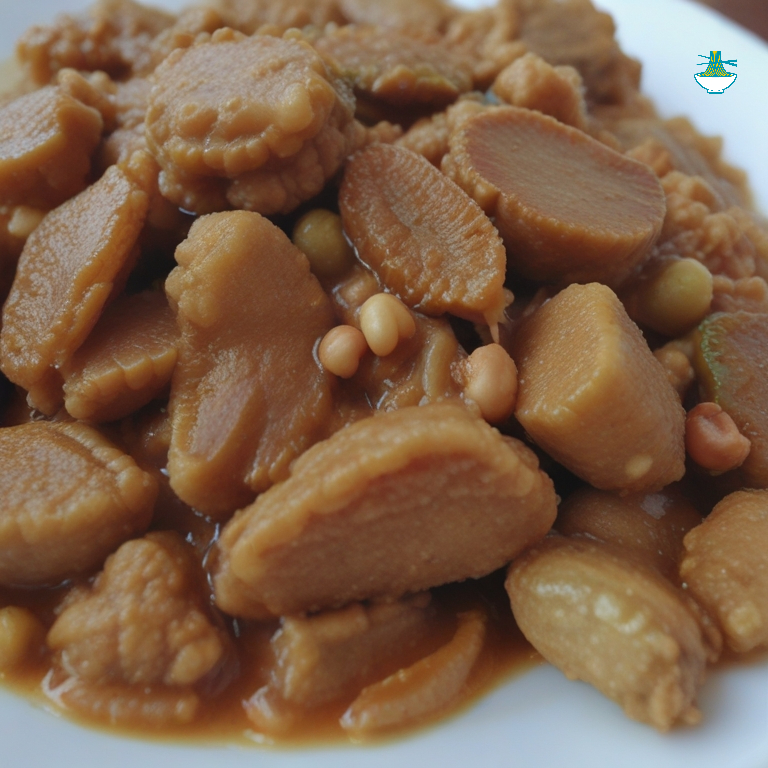Mwamba is a traditional Zambian dish made from dried fish and pounded groundnuts. The recipe combines the rich flavors of dried fish with the nuttiness of groundnuts, creating a hearty and flavorful meal. It is commonly served with nshima or rice.
Historically, Mwamba has been a staple dish in Zambian cuisine, reflecting the use of locally available ingredients such as dried fish and groundnuts. It is often prepared in households across Zambia, showcasing the culinary traditions and preferences of the region.
Ingredients:
- 250g dried fish
- 1 cup groundnuts (peanuts), roasted and pounded
- 2 tablespoons vegetable oil
- 1 onion, chopped
- 2 tomatoes, chopped
- 2 cloves garlic, minced
- 1 teaspoon paprika
- Salt and pepper to taste
- Water

Method of Preparation:
1. Soak the dried fish in water for about 30 minutes to soften.
2. In a pan, heat the vegetable oil over medium heat.
3. Add the chopped onion and garlic. Sauté until golden brown.
4. Add the chopped tomatoes and cook until they are soft and mushy.
5. Drain the water from the soaked fish and add it to the pan.
6. Stir in the pounded groundnuts, paprika, salt, and pepper. Mix well.
7. Add enough water to cover the ingredients and bring to a simmer.
8. Cook uncovered for about 15-20 minutes or until the fish is cooked and the sauce thickens.
9. Adjust the seasoning if needed.
10. Serve hot with nshima or rice.
Nutrition Value:
1. 250g Dried Fish:
- Calories: Approximately 220 calories
- Carbohydrates: 0g
- Protein: Approximately 50g
- Fat: Approximately 2g
- Sodium: Varies based on processing, typically around 400-800mg
- Cholesterol: Varies, typically around 50-100mg
- Nutritional Benefit: High in protein, omega-3 fatty acids, and essential minerals like iron and calcium.
2. 1 Cup Groundnuts (Peanuts), Roasted and Pounded:
- Calories: Approximately 828 calories
- Carbohydrates: Approximately 24g
- Protein: Approximately 37g
- Fat: Approximately 72g (mostly unsaturated fats)
- Sodium: Varies based on roasting method, typically low
- Cholesterol: 0mg
- Nutritional Benefit: High in protein, healthy fats (especially monounsaturated fats), fiber, vitamins (like vitamin E), and minerals (such as magnesium and phosphorus).
3. 2 Tablespoons Vegetable Oil:
- Calories: Approximately 240 calories
- Carbohydrates: 0g
- Protein: 0g
- Fat: Approximately 28g (mostly unsaturated fats)
- Sodium: 0mg
- Cholesterol: 0mg
- Nutritional Benefit: Provides healthy fats, such as monounsaturated and polyunsaturated fats, and vitamin E.
4. 1 Onion, Chopped:
- Calories: Approximately 44 calories
- Carbohydrates: Approximately 10g
- Protein: Approximately 1g
- Fat: 0g
- Sodium: Varies, typically low
- Cholesterol: 0mg
- Nutritional Benefit: Contains fiber, vitamin C, and antioxidants.
5. 2 Tomatoes, Chopped:
- Calories: Approximately 44 calories
- Carbohydrates: Approximately 10g
- Protein: Approximately 2g
- Fat: 0g
- Sodium: Varies, typically low
- Cholesterol: 0mg
- Nutritional Benefit: High in vitamin C, vitamin A, antioxidants like lycopene, and potassium.
6. 2 Cloves Garlic, Minced:
- Calories: Approximately 8 calories
- Carbohydrates: Approximately 2g
- Protein: 0g
- Fat: 0g
- Sodium: 1mg
- Cholesterol: 0mg
- Nutritional Benefit: Contains allicin, a compound with potential health benefits, as well as vitamins C and B6.
7. 1 Teaspoon Paprika:
- Calories: Approximately 6 calories
- Carbohydrates: Approximately 1g
- Protein: Approximately 0g
- Fat: 0g
- Sodium: Varies, typically low
- Cholesterol: 0mg
- Nutritional Benefit: Contains antioxidants like beta-carotene, vitamin A, and capsaicin.
8. Salt and Pepper to Taste:
- Calories: Varies based on quantity, typically negligible
- Carbohydrates: Varies, typically negligible
- Protein: Varies, typically negligible
- Fat: Varies, typically negligible
- Sodium: Varies based on quantity, typically moderate to low
- Cholesterol: 0mg
- Nutritional Benefit: Sodium is necessary in small amounts for electrolyte balance, while black pepper may have antioxidant properties.
9. Water:
- Calories: 0 calories
- Carbohydrates: 0g
- Protein: 0g
- Fat: 0g
- Sodium: 0mg
- Cholesterol: 0mg
- Nutritional Benefit: Essential for hydration and overall bodily functions.
These values are approximate and can vary based on specific brands, cooking methods, and ingredient sizes.


Comments